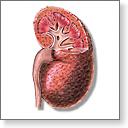Return to IndexStep 1: What is Blood Pressure?Step 2: Take High Blood Pressure SeriouslyStep 3: What Causes High Blood Pressure?Step 4: Who Gets High Blood Pressure?Step 5: High Blood Pressure is "Silent"Step 6: Diagnosing High Blood PressureStep 7: Follow-up Office VisitsStep 8: Treatment OverviewStep 9: Maintain Healthy HabitsStep 10: Drug TherapyStep 11: Monitor Your Blood Pressure at HomeStep 12: You and Your Doctor are a TeamKey PointsGlossary
*Close Menu*
Return to IndexStep 1: What is Blood Pressure?Step 2: Take High Blood Pressure SeriouslyStep 3: What Causes High Blood Pressure?Step 4: Who Gets High Blood Pressure?Step 5: High Blood Pressure is "Silent"Step 6: Diagnosing High Blood PressureStep 7: Follow-up Office VisitsStep 8: Treatment OverviewStep 9: Maintain Healthy HabitsStep 10: Drug TherapyStep 11: Monitor Your Blood Pressure at HomeStep 12: You and Your Doctor are a TeamKey PointsGlossary
*Close Menu*
| Secondary hypertension |
The term "secondary hypertension" refers to high blood pressure with recognizable causes, which are usually treatable or reversible.

Medical conditions
Several medical conditions can cause secondary hypertension:
- Kidney disease -- the kidneys control how much fluid and sodium are retained in the body and how much are excreted in the urine. Damage to the kidneys, therefore, can upset the balance of fluid and sodium -- which can lead to high blood pressure. Kidney disease is the number one cause of secondary hypertension, particularly in older people and those with diabetes or vascular disease.
- Sleep apnea -- this is a disorder in which breathing halts briefly but repeatedly during sleep. Some symptoms of sleep apnea include daytime sleepiness, restless sleep, and snoring. Overweight people are at higher risk for sleep apnea. Even mild sleep apnea is associated with high blood pressure, whether overweight or not. Sleeping with a device known as nasal continuous positive airway pressure is the treatment for this condition. As the sleep apnea improves, blood pressure tends to improve as well.
There are also several disorders of the adrenal glands that can cause high blood pressure. The adrenal glands are two small organs that sit above the kidneys and produce several important hormones.
- Hyperaldosteronism -- this condition results in excessive amounts of aldosterone, a hormone that helps balance fluid and sodium in the body. It can occur from enlargement of both adrenal glands or a tumor in one of the adrenal glands.
- Cushing syndrome -- this is caused by excessive amounts of a steroid hormone called cortisol, produced in the cortex of the adrenal glands. This can be caused by a tumor in the adrenal glands, a tumor in the pituitary gland in the brain, or a cortisol-secreting tumor anywhere else in the body (ectopic Cushing syndrome).
- Pheochromocytoma -- in this condition, the adrenal glands produce too much of the hormones that control heart rate and constriction in blood vessels (including the hormone adrenalin). This raises blood pressure. The condition is caused by a tumor in the adrenal medulla -- the center portion of the adrenal gland.
Medications
Certain prescription and over-the-counter drugs can cause temporary high blood pressure, such as:
- Corticosteroids -- such as prednisone and prednisolone; long-term use can lead to Cushing syndrome.
- Nonsteroidal anti-inflammatory drugs (NSAIDs) -- long-term use may injure the kidney and is an important cause of secondary hypertension in the elderly. Such drugs include ibuprofen (Advil, Motrin), naproxen (Anaprox, Naprosyn, Aleve), and many others.
- Cold medicines -- those containing pseudoephedrine increase blood pressure in people with high blood pressure, although they appear to pose no danger for those with normal blood pressure.
- Birth control pills -- increase the risk for high blood pressure, particularly in women who are over 35, overweight, smokers, or some combination. Stopping birth control pills nearly always reduces blood pressure within 6 months.
Alcohol, coffee, and cigarettes
- Alcohol -- An estimated 10% of high blood pressure cases are caused by alcohol abuse (i.e., three alcoholic drinks a day or more, with heavier drinkers having higher pressure). In one study, binge-drinkers had even higher blood pressure than people who drank regularly. Moderate drinking (one or two drinks a day) may have benefits for the heart and may even protect against some types of stroke.
- Smoking -- Smoking is a major contributor to high blood pressure.
- Caffeine -- Caffeine causes a temporary increase in blood pressure, which is considered harmless in people with normal blood pressure. However, a high intake of coffee may be harmful in people with high blood pressure. More research is needed.
Other causes
Temporary high blood pressure can result from a number of other conditions or substances, including:
- Stress
- Intense workouts (such as snow shoveling, jogging, speed walking, tennis, heavy lifting, heavy gardening)
- Long-term consumption of large amounts of the herb licorice
Review Date:
6/8/2011
Reviewed By: Steven Kang, MD, Division of Cardiac Pacing and Electrophysiology, East Bay Arrhythmia, Cardiovascular Consultants Medical Group, Oakland, CA. Review provided by VeriMed Healthcare Network. Also reviewed by David Zieve, MD, MHA, Medical Director, A.D.A.M., Inc.
Reviewed By: Steven Kang, MD, Division of Cardiac Pacing and Electrophysiology, East Bay Arrhythmia, Cardiovascular Consultants Medical Group, Oakland, CA. Review provided by VeriMed Healthcare Network. Also reviewed by David Zieve, MD, MHA, Medical Director, A.D.A.M., Inc.
The information provided herein should not be used during any medical emergency or for the diagnosis or treatment of any medical condition. A licensed medical professional should be consulted for diagnosis and treatment of any and all medical conditions. Links to other sites are provided for information only -- they do not constitute endorsements of those other sites. No warranty of any kind, either expressed or implied, is made as to the accuracy, reliability, timeliness, or correctness of any translations made by a third-party service of the information provided herein into any other language. © 1997-
A.D.A.M., a business unit of Ebix, Inc. Any duplication or distribution of the information contained herein is strictly prohibited.
